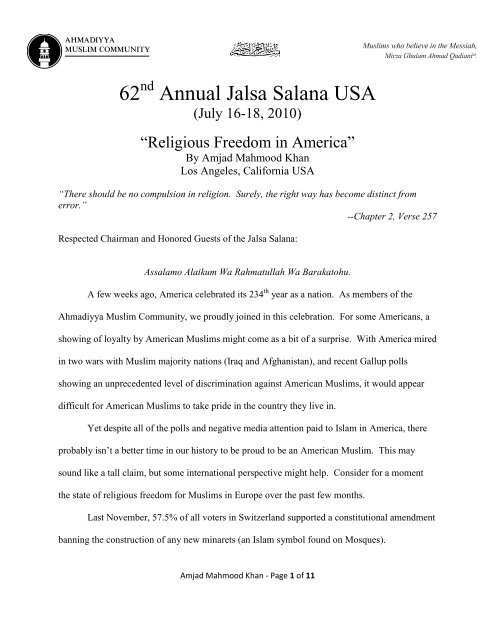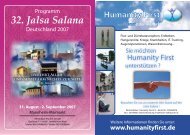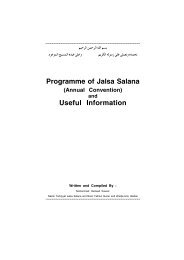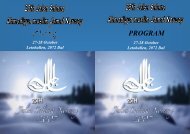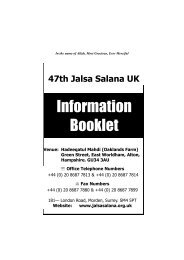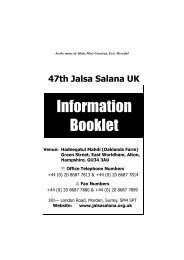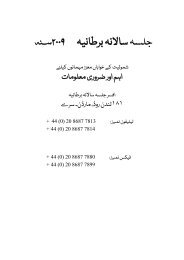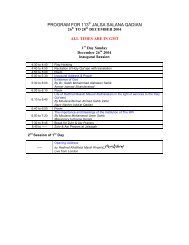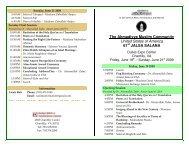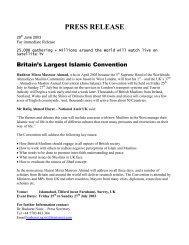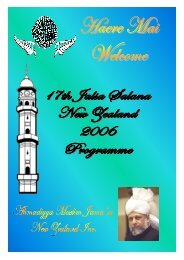Religious Freedom in America - Jalsa Salana USA 2010
Religious Freedom in America - Jalsa Salana USA 2010
Religious Freedom in America - Jalsa Salana USA 2010
Create successful ePaper yourself
Turn your PDF publications into a flip-book with our unique Google optimized e-Paper software.
62 nd Annual <strong>Jalsa</strong> <strong>Salana</strong> <strong>USA</strong><br />
(July 16-18, <strong>2010</strong>)<br />
“<strong>Religious</strong> <strong>Freedom</strong> <strong>in</strong> <strong>America</strong>”<br />
By Amjad Mahmood Khan<br />
Los Angeles, California <strong>USA</strong><br />
“There should be no compulsion <strong>in</strong> religion. Surely, the right way has become dist<strong>in</strong>ct from<br />
error.”<br />
--Chapter 2, Verse 257<br />
Respected Chairman and Honored Guests of the <strong>Jalsa</strong> <strong>Salana</strong>:<br />
Assalamo Alaikum Wa Rahmatullah Wa Barakatohu.<br />
A few weeks ago, <strong>America</strong> celebrated its 234 th year as a nation. As members of the<br />
Ahmadiyya Muslim Community, we proudly jo<strong>in</strong>ed <strong>in</strong> this celebration. For some <strong>America</strong>ns, a<br />
show<strong>in</strong>g of loyalty by <strong>America</strong>n Muslims might come as a bit of a surprise. With <strong>America</strong> mired<br />
<strong>in</strong> two wars with Muslim majority nations (Iraq and Afghanistan), and recent Gallup polls<br />
show<strong>in</strong>g an unprecedented level of discrim<strong>in</strong>ation aga<strong>in</strong>st <strong>America</strong>n Muslims, it would appear<br />
difficult for <strong>America</strong>n Muslims to take pride <strong>in</strong> the country they live <strong>in</strong>.<br />
Yet despite all of the polls and negative media attention paid to Islam <strong>in</strong> <strong>America</strong>, there<br />
probably isn’t a better time <strong>in</strong> our history to be proud to be an <strong>America</strong>n Muslim. This may<br />
sound like a tall claim, but some <strong>in</strong>ternational perspective might help. Consider for a moment<br />
the state of religious freedom for Muslims <strong>in</strong> Europe over the past few months.<br />
Last November, 57.5% of all voters <strong>in</strong> Switzerland supported a constitutional amendment<br />
bann<strong>in</strong>g the construction of any new m<strong>in</strong>arets (an Islam symbol found on Mosques).<br />
Amjad Mahmood Khan - Page 1 of 11
Last month <strong>in</strong> the Netherlands, the anti-Islam <strong>Freedom</strong> Party of MP Geert Wilders won<br />
23 seats <strong>in</strong> Parliament. Wilders has publicly demanded that the Qur'an be outlawed and that<br />
Muslim women who wear head scarves be taxed.<br />
Last week, the French parliament approved a ban of the burqa (or full Islamic veil) by a<br />
vote of 336 to 1. Support for a ban on the burqa is now widespread across Europe, with strong<br />
majority votes <strong>in</strong> Spa<strong>in</strong>, Brita<strong>in</strong> and Germany.<br />
For <strong>America</strong>n Muslims, these European headl<strong>in</strong>es come as a bit of a shock. Compared to<br />
European Muslims, <strong>America</strong>n Muslims appear to be progress<strong>in</strong>g much better.<br />
U.S. President Barack Obama recognized this very fact <strong>in</strong> his speech last year to the<br />
Muslim world <strong>in</strong> Cairo. He said:<br />
"<strong>Freedom</strong> <strong>in</strong> <strong>America</strong> is <strong>in</strong>divisible from the freedom to practice one's religion. That is why there<br />
is a mosque <strong>in</strong> every state of our union, and over 1,200 mosques with<strong>in</strong> our borders. That is why<br />
the U.S. government has gone to court to protect the right of women and girls to wear the hijab,<br />
and to punish those who would deny it."<br />
No state <strong>in</strong> <strong>America</strong> has laws that ban m<strong>in</strong>arets, headscarves, or any other k<strong>in</strong>d of Islamic<br />
custom or practice of the k<strong>in</strong>d France, Switzerland and other European nations seek to<br />
implement. In 2004, Oklahoma passed a law seek<strong>in</strong>g to ban the wear<strong>in</strong>g of headscarves <strong>in</strong> public<br />
schools, but a federal court quickly struck down the law as unconstitutional. This past April,<br />
Oregon ended an 87-year-old ban on teachers wear<strong>in</strong>g headscarves <strong>in</strong> schools.<br />
What is it about <strong>America</strong> that enables <strong>America</strong>n Muslims to exercise their faith more<br />
freely than anywhere else <strong>in</strong> the world? My speech this morn<strong>in</strong>g tackles this very important<br />
question <strong>in</strong> four parts. First, I will discuss the concept of religious freedom <strong>in</strong> <strong>America</strong>. Second,<br />
I will discuss the concept of religious freedom <strong>in</strong> Islam. In so do<strong>in</strong>g, I will underscore the<br />
strik<strong>in</strong>g similarities between the two concepts. Third, I will discuss how the modern Muslim<br />
Amjad Mahmood Khan - Page 2 of 11
world has deviated from the true Islamic concept of religious freedom <strong>in</strong> profound and tragic<br />
ways. F<strong>in</strong>ally, I will discuss some of our responsibilities as <strong>America</strong>n Muslims to champion the<br />
cause of religious freedom.<br />
Let me beg<strong>in</strong> by discuss<strong>in</strong>g the orig<strong>in</strong>s of religious freedom <strong>in</strong> <strong>America</strong>.<br />
<strong>America</strong>’s early found<strong>in</strong>g reflects a deep commitment to religious freedom. Most of the<br />
European settlers who came to North <strong>America</strong> <strong>in</strong> the Seventeenth Century fled Europe to seek<br />
religious freedom. The early immigrants to <strong>America</strong> – the Puritans – sought desperately to<br />
practice their own brand of Christianity. They founded Massachusetts as the “new Israel” – a<br />
new commonwealth based on a covenant between God and his people.<br />
But the Puritanical vision of a “holy society” was quickly met with resistance. The first<br />
and most famous dissenter, Roger Williams, himself a Puritan m<strong>in</strong>ister, disagreed with the state<br />
<strong>in</strong>terfer<strong>in</strong>g with religion. He put forth the first <strong>America</strong>n case for freedom of conscience for all.<br />
He founded Rhode Island – the first <strong>America</strong>n colony to grant the freedom of conscience to<br />
people of all faiths.<br />
The Rhode Island experiment slowly grew strength and momentum <strong>in</strong> the rest of early<br />
<strong>America</strong>. For example, William Penn, a Quaker, famously founded the colony of Pennsylvania<br />
<strong>in</strong> the Eighteenth Century as a “holy experiment” to preserve religious liberty for all.<br />
In 1776, the Declaration of Independence established <strong>America</strong> as a nation and declared<br />
emphatically the pr<strong>in</strong>ciple of equality for all people. But even the Declaration of Independence<br />
didn’t explicitly refer to religious liberty or religious tolerance.<br />
For the next eleven years, <strong>America</strong>’s found<strong>in</strong>g fathers wrestled with the idea of religious<br />
liberty and its <strong>in</strong>clusion <strong>in</strong> the U.S. Constitution. James Madison, <strong>in</strong> particular set forth a<br />
Amjad Mahmood Khan - Page 3 of 11
powerful defense of religious freedom as an <strong>in</strong>alienable right. His ideas formed the basis for the<br />
First Amendment to the U.S. Constitution, ratified <strong>in</strong> 1791.<br />
It is rather fitt<strong>in</strong>g to be speak<strong>in</strong>g about religious freedom here <strong>in</strong> Virg<strong>in</strong>ia. If you drive<br />
south from here about 2 hours, you will hit Chesterfield County – home to 318,000 people. 225<br />
years ago, the citizens of Chesterfield County did someth<strong>in</strong>g remarkable. On November 14,<br />
1785, they signed an unprecedented and path-break<strong>in</strong>g petition for religious freedom, which they<br />
submitted to the Virg<strong>in</strong>ia State Assembly. The Library of Congress has preserved this petition <strong>in</strong><br />
its archives and it reads:<br />
"Let Jews, Mehometans and Christians of every denom<strong>in</strong>ation enjoy religious liberty… … It is<br />
men’s labour <strong>in</strong> our Manufactories, their services by sea and land that aggrandize our Country<br />
and not their creeds. Cha<strong>in</strong> your citizens to the state by their Interest. Let Jews, Mehometans,<br />
and Christians of every denom<strong>in</strong>ation f<strong>in</strong>d their advantage <strong>in</strong> liv<strong>in</strong>g under your laws.”<br />
These sentiments ultimately found their way to the Bill of Rights just a few years later. The first<br />
words of the Bill of Rights consist of the two religion clauses of the First Amendment:<br />
“Congress shall make no law respect<strong>in</strong>g an establishment of religion, or prohibit<strong>in</strong>g the free<br />
exercise thereof…” Taken together, these two clauses safeguard religious liberty by protect<strong>in</strong>g<br />
religious beliefs from government <strong>in</strong>terference or control.<br />
220 years later, the religion clauses of the First Amendment rema<strong>in</strong> <strong>in</strong>tact and cont<strong>in</strong>ue to<br />
safeguard religious beliefs from government <strong>in</strong>terference or unlawful restrictions.<br />
The concept of religious freedom <strong>in</strong> <strong>America</strong> has a rich history. But the essential<br />
<strong>in</strong>gredients of this concept are def<strong>in</strong>itely not new. They are <strong>in</strong>spired <strong>in</strong> large part by the famous<br />
political writ<strong>in</strong>gs of John Locke and Jean-Jacque Rousseau. And they strongly resonate with the<br />
Islamic concept of religious freedom. In fact, Islam advanced the concept of religious freedom<br />
over 1,000 years before <strong>America</strong> was founded.<br />
Amjad Mahmood Khan - Page 4 of 11
Let me now turn to the Islamic concept of religious freedom.<br />
The start<strong>in</strong>g po<strong>in</strong>t for this analysis must beg<strong>in</strong> with the verse I recited at the beg<strong>in</strong>n<strong>in</strong>g of<br />
my speech:<br />
“There should be no compulsion <strong>in</strong> religion. Surely, the right way has become dist<strong>in</strong>ct from<br />
error.” (2:257).<br />
Among all other revealed texts, only the Qur’an stresses religious freedom <strong>in</strong> such unambiguous<br />
terms. In Islam, compulsion is <strong>in</strong>compatible with religion. Faith is an <strong>in</strong>dividual concern and<br />
commitment; it is a voluntary act born out of conviction and freedom. Believ<strong>in</strong>g Muslims should<br />
not compel another to believe <strong>in</strong> Islam because they have earned no such right. All people must<br />
be permitted to f<strong>in</strong>d the truth through their own path.<br />
Elsewhere, <strong>in</strong> Chapter 10, Verse 100 of the Qur’an, we read:<br />
“And if your Lord had enforced His will, surely, all who are on the earth would have believed<br />
together. Will you, then, force men to become believers?”<br />
This verse demonstrates that religious freedom is part of Allah’s design <strong>in</strong> Islam. Indeed, Allah<br />
admonishes Muslims not to use force <strong>in</strong> matters of faith. Forced faith is no faith at all.<br />
F<strong>in</strong>ally, an entire chapter of the Qur’an, Sura Al-Kafirun (109), specifies the prescribed<br />
conduct of Muslims with non-believers. Allah demands that believers declare emphatically that<br />
they will not force another to believe: “For you your religion, for me my religion.” Aga<strong>in</strong>, this<br />
is a strong and unambiguous proof of religious tolerance <strong>in</strong> Islam.<br />
These Quranic verses are not just theoretical pronouncements. They form the basis for<br />
true Islamic governance and protection of religious freedom. Indeed, the Prophet of Islam,<br />
Muhammad (sa), cherished these Quranic pronouncements and practically enforced them<br />
throughout his life.<br />
Amjad Mahmood Khan - Page 5 of 11
Prophet Muhammad (sa) actively promoted peace, tolerance and compassion for all non-<br />
Muslim m<strong>in</strong>orities liv<strong>in</strong>g <strong>in</strong> Arabia. He did not simply demand religious tolerance of his<br />
followers; his Sunnah was to provide legal and constitutional protections for religious m<strong>in</strong>orities.<br />
This is perhaps best illustrated by two historic documents prepared by Prophet<br />
Muhammad (sa).<br />
The first document is the Charter of Media written <strong>in</strong> 622 A.D. – a formal agreement<br />
between Prophet Muhammad (sa) and all of the significant tribes and families of Med<strong>in</strong>a,<br />
<strong>in</strong>clud<strong>in</strong>g Muslims, Jews and non-Muslim Arabs. Many scholars refer to this document as the<br />
first ever written constitution of a nation-state. The Charter of Med<strong>in</strong>a pre-dated the English<br />
Magna Carta by almost six centuries. It was executed and implemented for 10 years (622-632<br />
A.D.) and applied to 10,000 citizens liv<strong>in</strong>g <strong>in</strong> Med<strong>in</strong>a at that time. Remarkably 45% of the total<br />
population <strong>in</strong> Med<strong>in</strong>a consisted of non-Muslim Arabs, 40% consisted of Jews, and only 15%<br />
consisted of Muslims. These numbers were recorded by Prophet Muhammad (sa) himself<br />
through a census that he commissioned. In others words, Prophet Muhammad (sa) penned the<br />
Charter of Med<strong>in</strong>a as a m<strong>in</strong>ority sovereign. His express goal was to govern a multi-religious<br />
pluralistic society.<br />
The Charter consists of 47 clauses which set forth the formation of a sovereign nationstate<br />
with a common citizenship for all communities. The Charter protects fundamental human<br />
rights for all citizens, <strong>in</strong>clud<strong>in</strong>g equality, cooperation, freedom of conscience and freedom of<br />
religion. Clause 25 specifically states that Jews and non-Muslim Arabs are entitled to practice<br />
their own faith without any restrictions. In short, the Charter of Med<strong>in</strong>a was the first document<br />
<strong>in</strong> history to establish religious freedom as a fundamental constitutional right.<br />
Amjad Mahmood Khan - Page 6 of 11
But the Prophet Muhammad (sa)’s commitment to religious freedom did not just stop<br />
with the Charter of Med<strong>in</strong>a.<br />
With Islam’s ris<strong>in</strong>g <strong>in</strong>fluence <strong>in</strong> Arabia by 626 A.D., Jewish and Christian tribes endured<br />
severe struggles with certa<strong>in</strong> Muslim forces near Med<strong>in</strong>a. Prophet Muhammad (sa) sent a series<br />
of letters to various k<strong>in</strong>gs surround<strong>in</strong>g the Arab pen<strong>in</strong>sula declar<strong>in</strong>g his <strong>in</strong>tention for peace and<br />
cooperation. One such letter was written to the monks of the St. Cather<strong>in</strong>e Monastery of Mt.<br />
S<strong>in</strong>ai <strong>in</strong> 628 A.D. and known today as the “Charter of Privileges.”<br />
The letter reads:<br />
“This is a message from Muhammad, son of Abdullah, as a covenant to those who adopt<br />
Christianity, near and far, we are with them. Verily I, the servants, the helpers, and my followers<br />
defend them, because Christians are my citizens; and by Allah! I hold out aga<strong>in</strong>st anyth<strong>in</strong>g that<br />
displeases them. No compulsion is to be on them. Neither are their judges to be removed from<br />
their jobs nor their monks from their monasteries. No one is to destroy a house of their religion,<br />
to damage it, or to carry anyth<strong>in</strong>g from it to the Muslims' houses. Should anyone take any of<br />
these, he would spoil God's covenant and disobey His Prophet. Verily, they are my allies and<br />
have my secure charter aga<strong>in</strong>st all that they hate. No one is to force them to travel or to oblige<br />
them to fight. The Muslims are to fight for them. If a female Christian it married to a Muslim, it<br />
is not to take place without her approval. She is not to be prevented from visit<strong>in</strong>g her church to<br />
pray. Their churches are to be respected. They are neither to be prevented from repair<strong>in</strong>g them<br />
nor the sacredness of their covenants. No one of the nation of (Muslims) is to disobey the<br />
covenant till the Last Day (end of the world).”<br />
Amjad Mahmood Khan - Page 7 of 11
Western Islamic scholar, Marmaduke Pickthall, comments on this letter as follows:<br />
“The Charter which Muhammad (sa) granted to the Christian monks of S<strong>in</strong>ai is a liv<strong>in</strong>g<br />
document. If you read it, you will see that it breathes not only goodwill, but also actual love. He<br />
gave to the Jews of Med<strong>in</strong>a, so long as they were faithful to him, precisely the same treatment as<br />
to any Muslims. He never was aggressive aga<strong>in</strong>st any man or class of men . . . The story of his<br />
reception of Christian and Zoroastrian visitors is on record. There is not a trace of religious<br />
<strong>in</strong>tolerance <strong>in</strong> any of this.”<br />
The St. Cather<strong>in</strong>e Monastery at Mt. S<strong>in</strong>ai, which is now <strong>in</strong> present day Egypt, has been<br />
designated by UNESCO as a “World Heritage Site” and is considered to be the oldest active<br />
Christian monastery <strong>in</strong> the world. In fact, the official website of the St. Cather<strong>in</strong>e Monastery at<br />
Mt. S<strong>in</strong>ai proudly commemorates Prophet Muhammad (sa)’s letter of protection. The orig<strong>in</strong>al<br />
version of the letter can be found at the royal treasury <strong>in</strong> Constant<strong>in</strong>ople <strong>in</strong> Turkey. A copy is<br />
preserved on display at Mt. S<strong>in</strong>ai – a discovery mentioned by our beloved fourth Khalifa (rh) <strong>in</strong><br />
his various writ<strong>in</strong>gs about Prophet Muhammad (sa). To this date, the St. Cather<strong>in</strong>e monks<br />
cont<strong>in</strong>ue to practice their faith without restriction based on the protections granted to them by the<br />
Prophet Muhammad (sa) over 1,400 years ago. And the entire world stands as a witness to<br />
Prophet Muhammad (sa)’s sublime act of religious tolerance!<br />
<strong>America</strong> and Islam share a remarkably similar approach to religious freedom. It is an<br />
approach grounded <strong>in</strong> absolute freedom of conscience and belief, the free exercise of religion for<br />
all people, freedom from state control of religion and mutual respect, cooperation and peace.<br />
Let me now turn to part three of my speech. It is a tragic irony that much of the Islamic<br />
world has lost sight of Islam’s true and essential teach<strong>in</strong>gs concern<strong>in</strong>g religious freedom.<br />
Amjad Mahmood Khan - Page 8 of 11
Countries such as Indonesia, Egypt and Pakistan all currently have laws that suffocate the rights<br />
of religious m<strong>in</strong>orities.<br />
A dramatic example of this is one that hits very close to home. Six weeks ago <strong>in</strong> Lahore,<br />
the world witnessed a brutal crime aga<strong>in</strong>st humanity when armed gunmen massacred 86<br />
members of our m<strong>in</strong>ority Community and <strong>in</strong>jured hundreds more. But this wasn’t a random act<br />
of religious violence <strong>in</strong> Pakistan. This was a direct byproduct of decades of state-sponsored<br />
<strong>in</strong>stitutionalized persecution of religious m<strong>in</strong>orities. Pakistan is the only Muslim country to<br />
explicitly def<strong>in</strong>e who is or who is not a “Muslim” for purposes of the law. It is the only Muslim<br />
country to have a constitutional amendment that denies the right of a m<strong>in</strong>ority Muslim<br />
community to call itself “Muslim.” It is the only Muslim country to crim<strong>in</strong>alize fundamental<br />
religious practices by punishment of death. It is the only Muslim country to require its passport<br />
applicants to declare a m<strong>in</strong>ority community to be non-Muslim.<br />
How would the Prophet of Islam, Muhammad (sa), react to this state of affairs? Would<br />
he even recognize Pakistan as an Islamic nation? What would he say to the so-called Muslims<br />
who sent teenagers to Lahore to bomb hundreds of worshipers dur<strong>in</strong>g Friday prayers? To the socalled<br />
Muslims who burned alive eleven Christians <strong>in</strong> Gojra last year? To the so-called Muslims<br />
who bombed a Sufi religious shr<strong>in</strong>e <strong>in</strong> Lahore last month? The same Prophet Muhammad (sa)<br />
whose life was spent <strong>in</strong> vigorous defense of the oppressed, the orphans and the m<strong>in</strong>orities. The<br />
same Prophet Muhammad (sa) who gave refuge to a Christian delegation from Najran at his own<br />
mosque <strong>in</strong> Med<strong>in</strong>a. The same Prophet Muhammad (sa) who championed the constitutional<br />
rights of Jews and non-Muslim Arabs. The same Prophet Muhammad (sa) who said that<br />
differences of op<strong>in</strong>ion are a bless<strong>in</strong>g for society. When will Pakistan heed the example of the<br />
founder of Islam?<br />
Amjad Mahmood Khan - Page 9 of 11
F<strong>in</strong>ally, let me speak briefly about our obligations as <strong>America</strong>n Ahmadi Muslims. My<br />
dear brothers and sisters, we are proud to be <strong>America</strong>n. We cherish and enjoy freedom of<br />
religion more than any other nation on earth. Our constitution, the U.S. Constitution, is more<br />
Islamic than the constitutions of most Islamic countries. We are witness<strong>in</strong>g the erosion of<br />
religious freedom <strong>in</strong> the world. We witnessed our fellow Ahmadi Muslims massacred for<br />
practic<strong>in</strong>g their faith. But Allah will never let the sacrifices of the Ahmadi martyrs go to waste.<br />
Their memories are alive <strong>in</strong> all of us. We must step forward and safeguard the orig<strong>in</strong>al teach<strong>in</strong>gs<br />
of Prophet Muhammad (sa). We are the Muslims who believe <strong>in</strong> the messiah, Hadhrat Mirza<br />
Ghulam Ahmad of Qadian (as), who came to rescue Islam from the clutches of militancy.<br />
We must proclaim loudly that we are the protectors of Islam’s orig<strong>in</strong>al teach<strong>in</strong>gs. We<br />
believe <strong>in</strong> religious freedom for all people. We mustn’t rest until the Islamic world rids itself of<br />
the laws that embolden those who kill the <strong>in</strong>nocent and vulnerable. To my fellow <strong>America</strong>n<br />
Ahmadi Muslim youth <strong>in</strong> attendance here today, we have a special responsibility thrust upon us.<br />
As second generation immigrants, most of us have grown up <strong>in</strong> peace without any restriction on<br />
our Ahmadi beliefs and practices. We enjoy freedoms that others do not. We must not sit idle<br />
and watch atrocities such as the Lahore attacks to cont<strong>in</strong>ue unabated. We must heed the words<br />
of our beloved Khalifa and carry the torch of religious freedom to our leaders and lawmakers and<br />
demand a change <strong>in</strong> the Islamic world.<br />
I conclude with the exhortations of our beloved Khalifatul Masih Rabay (rh) to the<br />
Ahmadis of North <strong>America</strong>. In his clos<strong>in</strong>g address at the Annual Convention <strong>in</strong> 1992, he said:<br />
“Ay Amrika or Canada kay Ahmadio. Thum kub thuk bayro ki labas may z<strong>in</strong>dagee busur karo<br />
gay. Uto, or <strong>in</strong> laybaso ko chaak kurtho. Thum khuday kay shair ho. Or shairo ki thura<br />
dundanathay huay or gurujthay ho ay junglo per fatahyaab ho. Bhus, khuda thumaray sath ho.<br />
Khuda thumaray sath ho. Khuda thumaray sath ho.”<br />
Amjad Mahmood Khan - Page 10 of 11
“O Ahmadis of <strong>America</strong> and Canada, for how long will you rema<strong>in</strong> <strong>in</strong> sheep’s cloth<strong>in</strong>g? Wake<br />
up! Discard that cloth<strong>in</strong>g. You are the lions of Allah! And like lions, with might and tenacity,<br />
you must conquer the jungles ahead of you. May God be with you. May God be with you. May<br />
God be with you.”<br />
May Allah give us lion-like courage to fight for religious freedom all over the world. Ameen.<br />
Amjad Mahmood Khan - Page 11 of 11


